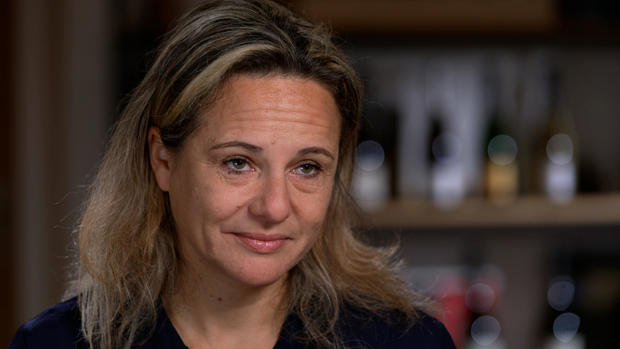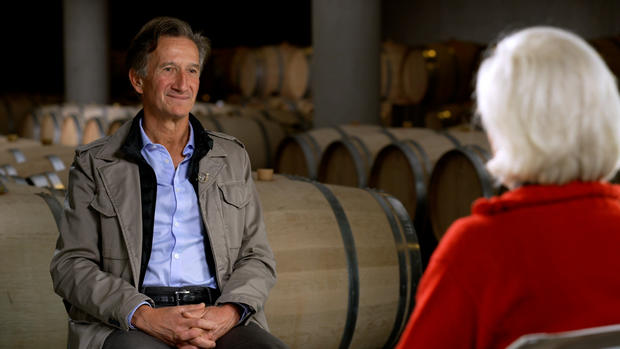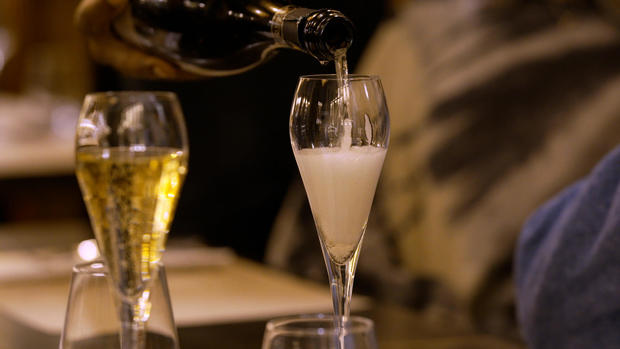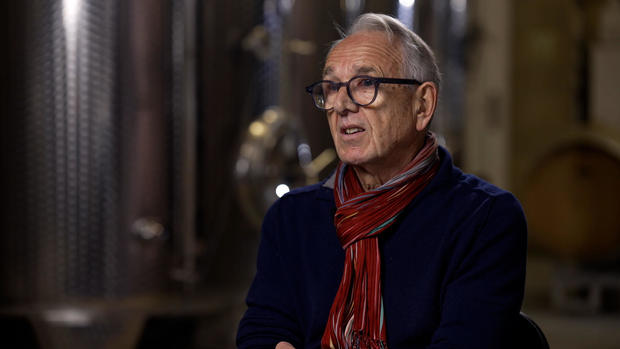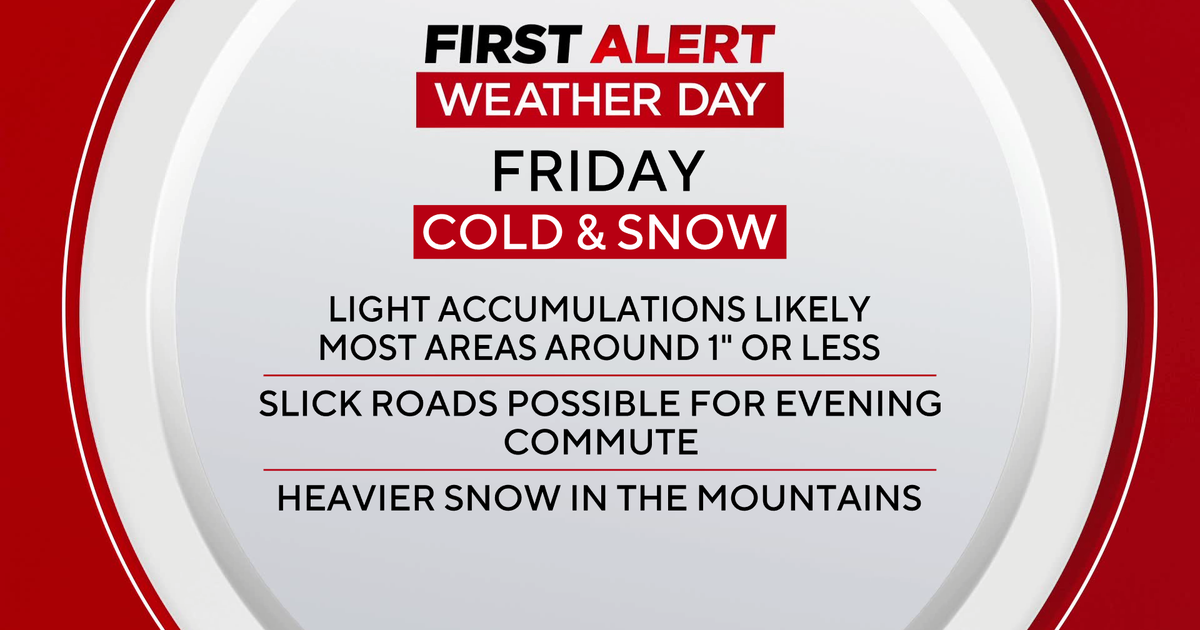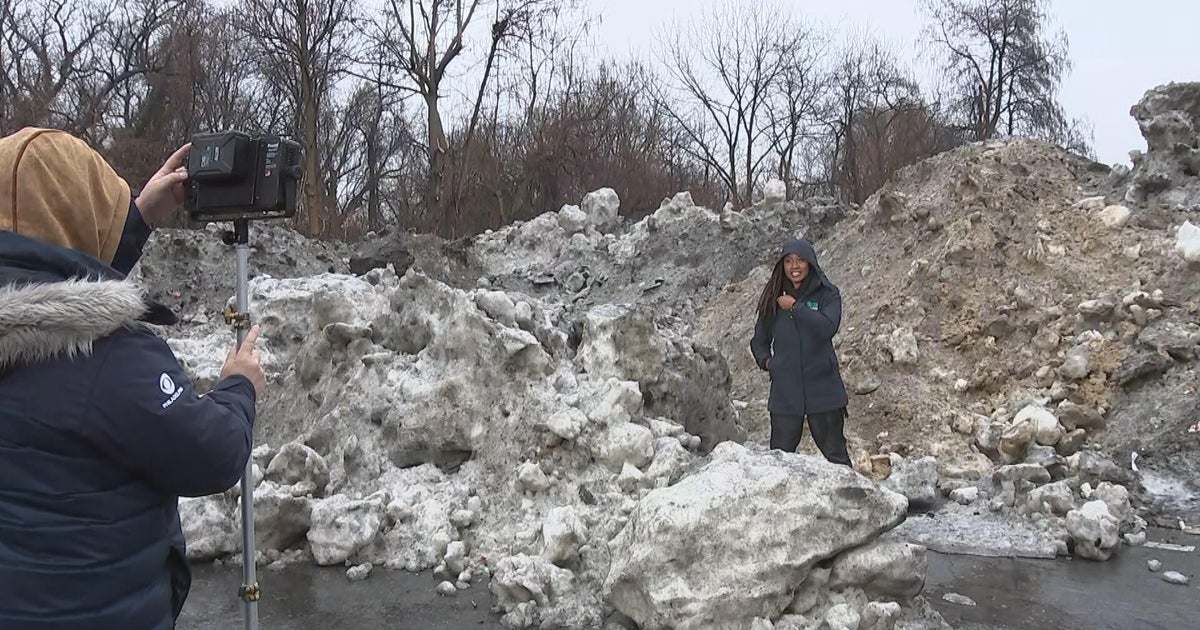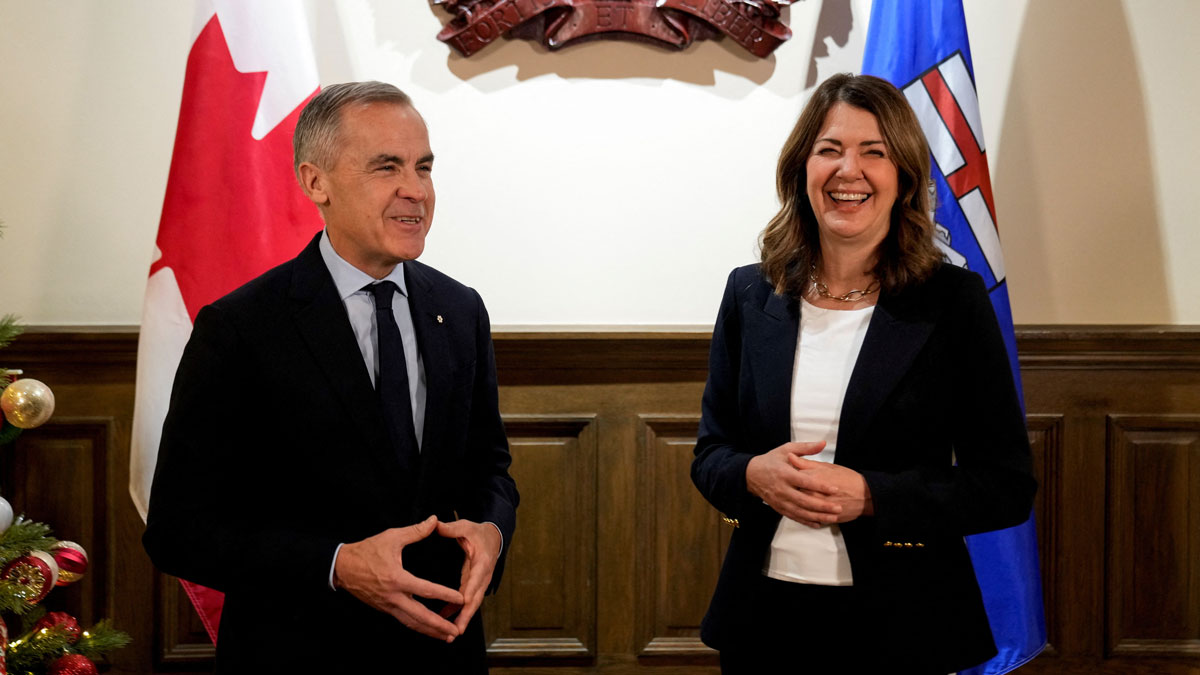Effects of climate change taking root in the wine industry
What are the signs of global warming? Glaciers are melting at an increasingly rapid pace. Persistent droughts are spreading. Well, we have another to tell you about – wine, as in what you probably cracked open for Christmas dinner.
Farmers who grow the grapes have seen the effects of climate change in the soil, in the roots of the vines, and the yields of their crops.
France, a major center of winemaking for centuries, is experiencing increasingly higher temperatures and extreme weather conditions that have damaged vintages, and livelihoods; this year was particularly dramatic.
France recorded its smallest harvest since 1957 and stands to lose more than $2 billion in sales - a huge blow to the country's second largest export industry.
And it's hitting nearly all the winegrowing regions where they make dry whites, fruity reds and fizzy champagne.
All bubblies are called sparkling wine. But champagne is made here and nowhere else –
in these vineyards and villages of Champagne located in northeastern France. There's a mystique to champagne, an aura of romance. Coco Chanel once said, "I only drink champagne on two occasions, when I am in love and when I am not." They've been producing this "wine of kings" here for centuries.
Lesley Stahl: So how long has this winemaking business and the vineyards been in your family?
Christine Sevillano: From 1700.
Lesley Stahl: 1700.
Christine Sevillano: Yes.
Christine Sevillano took over the family business and its 20 acres of vines 14 years ago. She's the 10th generation.
Christine Sevillano: This is the cellar of my grandfather.
Lesley Stahl: Oh.
After surviving the French Revolution and two world wars, her family's house of Piot-Sevillano faced its worst year ever in 2021.
Christine Sevillano: We lost 90% of our harvest.
Lesley Stahl: 90%?
Christine Sevillano: Yes.
Lesley Stahl: How many bottles were you able to produce this year as opposed to a normal year?
Christine Sevillano: A normal year, I produce around 40, 50,000 bottles.
Lesley Stahl: And this year?
Christine Sevillano: Zero. It's the first time in the history of my winery that we will not make champagne.
Lesley Stahl: Not a single bottle from this winery?
Christine Sevillano: Yes.
Higher temperatures and extreme weather episodes devastated not only her harvest but much of Champagne's.
Christine Sevillano: It rained in two or three days that it rained normally in one month. Even my father told me that in his career he has never seen that.
Lesley Stahl: Almost flood like?
Christine Sevillano: Yes.
The worst of it, she says, came in June and July when the heat and the rains resulted in a more crippling outbreak than usual of funguses like mildew contamination.
Christine Sevillano: In fact, when the grapes are contaminated, the-- the fruit is drying and after we can't use it because there is no juice, nothing.
Lesley Stahl: And you attribute this to climate change?
Christine Sevillano: Yes, because it was so extreme. It's not normal.
This year's extreme weather not only battered Champagne and the foundation of its economy, but nearly every one of the wine-producing regions in France -- Burgundy to Bordeaux, where some of the highest quality, best-known and best-tasting reds and whites are made.
Lesley Stahl: And these are what grape? What what--
Jacques Lurton: This is merlot.
Lesley Stahl: I love merlot.
Jacques Lurton: Yeah, merlot makes a beautiful, soft-rounded wines.
Jacques Lurton, the head of a wine family dynasty, runs the Château La Louvière and several other wineries in Bordeaux. He says vine disease is getting worse all over France because of the rising temperatures.
Jacques Lurton: We don't have winters anymore, almost. In wintertime, normally you get colder conditions. These cool conditions tend to kill the funguses or the disease. So normally, winter cleans the situation, you see? But the most important problem that we have is what we call spring frost.
Spring frost was so severe in April this year that winegrowers were on their knees lighting bales of hay and candles between their vines in a mostly futile attempt to protect their young buds.
Jacques Lurton: It is the largest catastrophe we have ever suffered. Because before we had some spring frost in some regions, but this is the first time we have it all over France. Now, due to the fact that we don't have these very strong winters, the buds start to open and then expose themself to this series of spring frost that we have.
Lesley Stahl: And that is the crux--
Jacques Lurton: And that, you see, is what affect the most the quantity of the grapes.
Lesley Stahl: So, tell us about this year in terms of the amount.
Jacques Lurton: In average, in France this year, a loss of 30%.
Lesley Stahl: 30% of the yields. And what about you? What's your percent?
Jacques Lurton: And us, we have been affected up to 40%.
Lesley Stahl: So, you're one of the largest wine producers in Bordeaux. 40% loss, I mean that's, that's enormous.
Jacques Lurton: It's huge. It's huge.
For Bordeaux, he estimates a loss of roughly $800 million in sales this year.
Lesley Stahl: Is this something that's happening all over Europe or—or just France?
Greg Jones: No. It's happening all over Europe, definitely.
Greg Jones is a research climatologist with Southern Oregon University who for 25 years has specialized in the study of how climate influences the growing and harvesting of wine grapes.
Greg Jones: What we're seeing today is we're seeing more of these extreme events happening more frequently at greater degrees and causing more problems.
Lesley Stahl: Yeah, we see it everywhere. It's not just in farm regions. I mean, every part of our country is experiencing some extreme weather condition. So how do you know it isn't that normal extreme weather as opposed to a general climate change?
Greg Jones: There's an area in climate science called attribution science. And attribution science is all about trying to kind of understand how much role humans have in the game of-of climate. So the idea—
Lesley Stahl: --or who to attribute it to, okay.
Greg Jones: Yeah, yeah. So what climatologists do is we develop models that look at aspects of climate. And those models that are coming out are really telling us more and more that in the absence of humans, most of these things would not occur to the same degree they're occurring today.
Lesley Stahl: Tie what you're saying about climate to what's going on in France now.
Greg Jones: Sure. In, in France, just like most of Europe, temperatures have gone up. Summers have gotten dryer. And wine grapes are just sensitive. They're sensitive to those kind of changes and, and we've been seeing it worldwide. And Europe has been at the epicenter of it.
A weather map of Europe for June 2021 – the second warmest June in Europe on record – shows a red band depicting high surface air temperatures stretching across much of the continent.
Heatwaves were also recorded over western North America in June 2021.
Scorching temperatures and drought conditions contributed to wildfires in 2020 around Napa and Sonoma – the center of America's wine industry where fields were left blackened.
In Australia, the bush fires of 2019 and '20 burnt some vineyards to the ground while smoke ruined the quality of the grapes.
In 2017 in Italy, spring frost combined with hailstorms and a heatwave known as "Lucifer" led to the lowest harvest in decades. Particularly hard hit was northern and central Italy, where prosecco, barolo and chianti are made.
And in parts of Chile and Argentina, higher temperatures are pushing winegrowers to plant their vineyards at higher altitudes where temperatures are cooler.
Greg Jones says the warming atmosphere is also changing the grapes' growth cycle.
Greg Jones: It accelerates that ripening to the point that we're picking earlier. For example, 2020, in Burgundy, the picking date was August 20th. And prior to that, we've been averaging for the last 30 years about September 15th. And then for 600 years before that we were averaging the end of September, 1st of October. So you can--
Lesley Stahl: --Oh, so it's dramatic.
Greg Jones: So it's pretty dramatic.
These pages of parchment, documenting harvest dates going back as far as 1354, were found in the Church of Notre Dame in Burgundy.
Lesley Stahl: 1354.
Greg Jones: It's a wonderful data record that we've been able to look at to better understand what climates were like back then, how it affected harvests and what that looks like today.
Lesley Stahl: I'm smiling because I'm thinking 1300s, I'm thinking the monks were making wine.
Greg Jones: Well, exactly.
The wine industry in France is so vital to the economy that the government has scientists studying ways to adapt and mitigate the changing environment.
One route to adaption is to introduce new grape varieties.
Experimental vineyards have been planted with vines from warmer climate countries to see if they can grow here so the grapes can be blended in with the merlots, cabernets and other french wines.
Nathalie Ollat is the director of the project at the Bordeaux Science Institute of Vine and Wine.
Lesley Stahl: So, you're looking at grapes that come from southern regions that maybe grow better in warmer climates?
Nathalie Ollat: Yes.
Lesley Stahl: Like from where?
Nathalie Ollat: From Spain, from Portugal, from Greece.
Lesley Stahl: How many are you actually looking at?
Nathalie Ollat: So, in this experimental vineyard, we are studying 52 different varieties.
They've chosen six of those varieties thus far to be planted in Bordeaux.
Lesley Stahl: So, this is your greenhouse?
Nathalie Ollat: Yes. This-- it is.
A second route of adaptation is genetic breeding.
Lesley Stahl: Are you actually creating new grapes, new, different kinds of grapes?
Nathalie Ollat: Yes, the idea is to have grapes– new varieties, which can be resistant to disease and also more adapted to climate change condition.
And do not compromise the distinctive qualities of the French wines. At the institute's laboratory, scientists are studying the genetics of wine's color, aroma and taste.
Lesley Stahl: And that's what you're trying to preserve, even as you introduce new grapes?
Nathalie Ollat: Yes. I think we-- we want to change without changing, I would say.
Lesley Stahl: Yes! How confident are you that you're gonna crack the puzzle, you're gonna figure out how to stay ahead of climate change?
Nathalie Ollat: All together with new varieties, new growing practice I think we can-- we can cope with climate change at least until the-- the middle of the 21st century.
Lesley Stahl: The middle of the century is only 30 years from now.
Nathalie Ollat: Yeah, yeah.
Lesley Stahl: So, you're looking at how fast temperatures are rising and you're saying it's possible that they will rise above a point--
Nathalie Ollat: That it-- it--
Lesley Stahl: --where you can't--
Nathalie Ollat: --It will be much more complicated to keep what we call Bordeaux style and Bordeaux taste.
With all the gloom and doom about warming temperatures in wine country, there's actually a surprising upside.
Lesley Stahl: What about quality? What about the taste, what's important about wine? How is climate change affecting that?
Jacques Lurton: Alors, the climate change is affecting the quality very positively.
Lesley Stahl: Positively?
Jacques Lurton: Yes, ex- exactly. We have never seen such a large quantity of good vintages of Bordeaux wines.
Lesley Stahl: Well, explain that. That's counterintuitive.
Jacques Lurton: Thanks to the global warming and the climate change, now we have warmer summers and which means that our grapes are ripening better. If we get good, warm conditions, we have good color quantity in the-- in the skin. But as well, we have the right amount of sugar.
What a painful irony-- the taste improves just as the yields are shrinking for winemakers like Christine Sevillano.
Lesley Stahl: So, more quality, but fewer grapes. Dramatically fewer grapes.
Christine Sevillano: Yes. It's crazy.
Lesley Stahl: If you have another year like this one, financially, can you survive?
Christine Sevillano: It will be difficult, really. Really difficult. But at the same time, I'm trustful for next year. I mean, I'm trustful. I have to.
Improved taste is not the only unforeseen benefit of climate change for some winemakers.
For some winegrowers, climate change has been a disaster, as we've seen, but as it turns out, climate change has been a boon for others. While higher temperatures have hurt growers in France and Italy, for instance, places that historically have been too cold to produce quality wines are now turning out consistently good ones: places like England.
The notion that in England the only beverage is lukewarm ale at the pub -- is woefully outdated.
Today, a new industry has taken root: healthy vineyards in England are producing some of the world's best wines. This sprawling vineyard with acres and acres of wine grapes ready for harvest is located in Kent -- 40 miles outside of London.
It didn't exist 15 years ago. But Great Britain's wine-producing fortunes have been heating up along with the planet.
Lesley Stahl: So, how has climate change affected the grapes, the wine, in this region?
Stephen Skelton: Well, it's completely revolutionized it.
Stephen Skelton, a member of the highly-respected Institute of Masters of Wine, is a viticulturist, an expert in the science, production and business of wine grapes.
Lesley Stahl: I never heard of really good English wine, I have to be honest with you.
Stephen Skelton: No, it was— it was very, very rare until we realized that you could grow these classic French champagne varieties in, in our climate.
Lesley Stahl: This is what they grow in Champagne?
Stephen Skelton: Yeah. And they now grow very, very successfully here in–- in the U.K..
What used to be a minute cottage industry run by retirees and gentleman farmers is today one of the fastest winegrowing regions in the world.
Lesley Stahl: This is quite an operation going on.
Stephen Skelton: Oh, it's big, it's a big winery.
In 2018, the vintage in England was so bountiful that some vineyards had to scramble to buy vats and tanks to hold it all. Others simply threw grapes away. By the end of the decade, winemakers here will produce an estimated 20 million bottles a year.
Stephen Skelton: The foundation of today's industry is the fact that we can grow these varieties, which we couldn't grow earlier.
Lesley Stahl: So, why couldn't you do it before?
Stephen Skelton: Because the-- the climate was too cold.
Lesley Stahl: You just had to get the temperature up and--
Stephen Skelton: Yeah.
Lesley Stahl: So, does global warming mean that England now has more days for the grapes to ripen? Is that—
Stephen Skelton: Yeah, because we have more days over 85, 86 degrees Fahrenheit. We are, we are in the U.K. now. We're now where Champagne was 30 or 40 years ago. The climate has shifted in 30 or 40 years upwards, north-- northwards.
Lesley Stahl: So, the climate, right now, where you and I are sitting in England, is the same as the climate was 40 years ago in France--
Stephen Skelton: In Champagne.
Lesley Stahl: --In Champagne, France--
Stephen Skelton: In Champagne. Yeah.
He traces the birth of the industry here to 1988.
Stephen Skelton: Then there came two Americans, the Mosses, Stuart and Sandy Moss. They bought an estate called Nyetimber, which is very well-known today. And they were the first people to plant a big commercial vineyard.
Lesley Stahl: What did you think?
Stephen Skelton: I thought they were bonkers. I have to say—
Lesley Stahl: Ok.
Stephen Skelton: Yeah, I thought they were nuts. I heard they were rich Americans from up in the hills. He had a fortune from apparently dental, the dental business. And I thought they were mad. Their first wine took-- took a long while to mature. It was four years in the making before it was tasted. And then it won this major prize.
Lesley Stahl: Right away? Four years.
Stephen Skelton: Yeah, yeah. And the next year, the second year, they won an even bigger prize.
Lesley Stahl: Are you thinking that in a couple of years, the English sparkling wine will be actually better than what they're growing in Champagne?
Stephen Skelton: They produce 300 million bottles a year. The best is still very, very good. The best is superb. But you could line up the best ten English sparkling wines against the best ten champagnes in the same sort of prize category, I can guarantee you the English wines would be-- would be in the top half.
To prove his point, he gave us a taste, opening a 10-year-old bottle.
Stephen Skelton: We're going to open it professionally.
Lesley Stahl: Oh, no pop!
Stephen Skelton: No pop.
Lesley Stahl: Look at that.
The longer sparkling wine ages, he says, the better, and what you look for is the spritz of fizz on the palette.
Stephen Skelton: You see, you've got the bubbles coming from there--
Lesley Stahl: And that's a good thing.
Stephen Skelton: Yeah, you see, they're nice and small. And then you nose it. You get a nice yeasty character. Baking bread-- brioche, as we call it. And that's a gorgeous, gorgeous bottle of wine.
Winston Churchill once said: "I could not live without champagne. In victory I deserve it, in defeat I need it!"
Well, nothing would have pleased him more than to hear that because English bubbly is now so good, the House of Taittinger – one of the most prestigious of French champagne makers – is in England! It's now growing 120 acres of grapes and is making sparkling wine near Canterbury in what's known as "the Garden of England."
Patrick McGrath, who represents Taittinger in Great Britain, persuaded the company to invest here in 2015.
Lesley Stahl: Have you brought the grapes from France?
Patrick McGrath: Yeah. The-- the vines were imported from France as-- as tiny, little vines. And the first crop we had from them was in 2020. And then that wine will be released at the end of 2024.
Lesley Stahl: You know, in-- in France, part of the problem is not just warming, it's extreme weather conditions. You know, too much flooding, too much frost, too hot. Won't England also have extreme situations like that?
Patrick McGrath: Not at the moment. We're fortunate, you know England is coming on to the radar as being an area that is warming but is still moderate in terms of heat compared to south and central Europe where it's becoming very, very hot.
Lesley Stahl: Do you think that wine lovers around the world already know that great wines are coming out of England? In other words, is it "ooh la la" no more? It's "jolly good?"
Patrick McGrath: I think, I think in-- we're still at the sort of s-- in the starting block. But certainly, yes. Over the last ten years the-- from a small base the sales of English have been growing substantially.
Taittinger's aim is to produce 300,000 bottles a year by 2025. Overall, the English wine industry had $220 million in sales last year.
The idea of first-rate English wine would have been laughed at 20 years ago, but a similar migration has happened on the West Coast of the United States, where excellent and increasingly popular pinot and chardonnay grapes are now found 560 miles north of Napa, in Willamette Valley, Oregon.
Greg Jones: In the 1950s and '60s, there were really almost no gr-- grapes grown in Oregon. And that was because the climates were too cold. And so, if you fast forward to where we are today, we're just in a different world.
Greg Jones, a wine climatologist at Southern Oregon University, says grapes are now growing in even more unexpected places.
Greg Jones: We have wineries today in Norway, in Quebec, in-- in British Columbia, in Tasmania, in the south islands of-- of Chile.
Lesley Stahl: Tasmanian wine.
Greg Jones: Yeah, Tasmania's really been burgeoning as really a great wine producing region in Australia.
Lesley Stahl: Oh, well that's interesting. Tasmania is south of Australia.
Greg Jones: Sure.
Lesley Stahl: So, as winemaking goes north in the Northern Hemisphere, are you saying it's going south--
Greg Jones: South. Yes, yeah--
Lesley Stahl: --in the Southern Hemisphere?
Greg Jones: Yeah. It's going further poleward in both hemispheres. In parts of southern Argentina and Chile. And, and parts of– of many parts of northern Europe have started growing grapes.
Lesley Stahl: In real time.
Greg Jones: In real time.
Lesley Stahl: So, if you really want a very vivid-- now, example of what's happening due to climate change, go look at wine.
Greg Jones: Yeah, you can. People are experimenting at, at northerly latitudes that I'm amazed that in my career I didn't think I would see it.
In the United Kingdom, as a measure of its acceptance, English sparkling wine has had the royal imprimatur, the queen serving it at Buckingham Palace. And it was poured at the recent climate change summit in Scotland. Master of wine Stephen Skelton is bullish on the future.
Lesley Stahl: If global warming is intensifying, how worried are you and the other English vintners that it's gonna move north beyond your ability to grow good grapes--
Stephen Skelton: No, I'm not worried at all. I mean, the next 40 years is gonna be fascinating, I think. Because, you know, we're just on the cusp of it being really commercial. Our yield levels are not quite where we want them yet. You know, we l-- would like a little bit more heat.
Lesley Stahl: You might get it.
Stephen Skelton: Yeah.
Lesley Stahl: But eventually.
Stephen Skelton: Who knows? We'll have to start growing oranges and bananas.
Lesley Stahl: I mean, it's a serious question.
Stephen Skelton: Yeah, personally, I think we will cope with-- with what's being thrown at us.
Some of the winemakers we met are benefiting. Some are suffering. But all are seeing first-hand the message that climate change is delivering.
Greg Jones: Wine grapes have often been called the canary in the coal mine.
Climatologist Greg Jones says that's been true since the first wine was made in 6,000 B.C. in eastern Europe and then spread to ancient Egypt, Greece, and Persia. Kings celebrated their victories with wine, and the Christian world put it at the heart of the Eucharist. Wine history, Jones says, is human history.
Greg Jones: Wine touches society in some pretty powerful ways. It's related to civilizations, it's related to history, it's related to geography, it's related to romanticism, art, gastronomy, biology, chemistry. So, there's so many things that are tied to it that it becomes something that we can, we can tell the story of climate change through wine pretty easily.
Produced by Richard Bonin. Associate producer, Mirella Brussani. Broadcast associate, Wren Woodson. Edited by Richard Buddenhagen.

